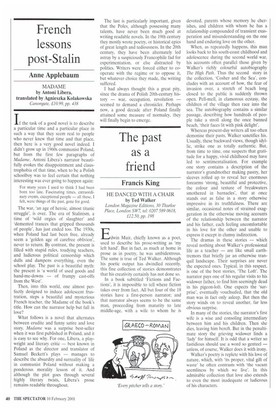French lessons post-Stalin
Anne Applebaum
MADAME by Antoni Libera, translated by Agnieszka Koiakowska Canongate, £10.99, pp. 438 If the task of a good novel is to describe a particular time and a particular place in such a way that they seem real to people who never knew that time and that place, then here is a very good novel indeed. I didn't grow up in 1960s communist Poland, but from the first few paragraphs of Madame, Antoni Libera's narrator beautifully evokes the disappointment and claustrophobia of that time, when to be a Polish schoolboy was to feel certain that nothing interesting was ever going to happen again:
For many years I used to think I had been born too late. Fascinating times, extraordinary events, exceptional people — all these, I felt, were things of the past, gone for good.
The war, 'an age of heroic, almost titanic struggle', is over. The era of Stalinism, a time of 'wild orgies of slaughter' and 'demented trances that gripped thousands of people', has just ended too. The 1930s, when Poland had last been free, already seem a 'golden age of carefree oblivion', never to return. By contrast, the present is filled with stupid rules, toadying teachers, and ludicrous political censorship which dulls and dampens everything, even the school play. The past is a beautiful myth: the present is 'a world of used goods and hand-me-downs — of frumpy cast-offs from the West'.
Then, into this world, one almost perfectly designed to induce adolescent frustration, steps a beautiful and mysterious French teacher, the Madame of the book's title. How can the narrator help but fall in love?
What follows is a novel that alternates between erudite and funny satire and love story. Madame was a surprise best-seller when it was first published in Poland, and it is easy to see why. For one, Libera, a playwright and literary critic — best known in Poland as the director and translator of Samuel Beckett's plays — manages to describe the absurdity and surreality of life in communist Poland without making a ponderous morality lesson of it. And although the plot goes through several highly literary twists, Libera's prose remains readable throughout. The last is particularly important, given that the Poles, although possessing many talents, have never been much good at writing readable novels. In the 19th century they mostly wrote poetry, or historical epics of great length and tediousness. In the 20th century, they have been alternately led astray by a suspiciously Francophile fad for experimentation, or else distracted by politics. Writers were forced either to cooperate with the regime or to oppose it, but whatever choice they made, the writing suffered.
I had always thought this a great pity, since the drama of Polish 20th-century history — war, occupation, revolution — seemed to demand a chronicler. Perhaps now, a good decade after Poland finally attained some measure of normalcy, they will finally begin to emerge.


































































 Previous page
Previous page